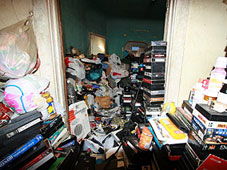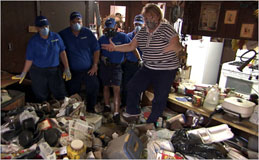
The Power of Stuff
by Deborah Beach Giordano
Fascination
 It happened again just the other night. We were innocently flipping through the television channels when suddenly .... there it was, in all its distorted grandeur: Hoarders.
It happened again just the other night. We were innocently flipping through the television channels when suddenly .... there it was, in all its distorted grandeur: Hoarders.
Perhaps you have greater willpower and can resist, but I am invariably sucked into the program’s horrible vortex. Who are these people? How does this behavior get started, and how on earth can it continue? Why doesn’t somebody just get in there with some garbage bags and start throwing? How can anybody get emotionally attached to stacks of junk?
I am entranced; intrigued, baffled and annoyed by the motivation behind the obsessive gathering. The endless piles of boxes, bins and bottles, the mold, muck and mice, decay and disarray; the excuses and justifications; the confused, angry, and grieving friends and family.... For a while it is fascinating.
Not in My House!
Then, all at once revulsion or frustration overrides all other feelings and I change the channel.
 Shortly thereafter — usually within minutes — I start going through closets and cupboards, sorting out things we don’t use. Before long there is a bag or two ready to go to the charity shop or local food bank. No way am I going to end up buried under useless “stuff.”
Shortly thereafter — usually within minutes — I start going through closets and cupboards, sorting out things we don’t use. Before long there is a bag or two ready to go to the charity shop or local food bank. No way am I going to end up buried under useless “stuff.”
Most of us have managed to accumulate things that just sit around taking up space — things that other folks could put to use; so it is a good practice to periodically take stock of what’s in our closets and on our shelves. The result is less clutter in our homes and worthwhile donations to charities. Everybody wins.
A Modern Problem
So the program does serve a useful purpose in a way. But it is disturbing and troubling; casting a light on the madness and suffering of hoarding: the apparently wide-spread obsession to accumulate stuff.
It is, as they say, a “first world problem.” Only those who live in wealthy nations can afford to assemble these massive amounts of food, clothing, or merchandise.
And, perhaps, it is only those who live in wealthy nations who believe that stuff can bring us comfort.
Why?
 Almost invariably the psychologists, friends, family and the hoarder attribute the beginning of the obsession to a loss: death, divorce, injury or illness. The individual responded to a heavily emotionally-charged experience by building a modern-day fortress; surrounding himself with a wall of things.
Almost invariably the psychologists, friends, family and the hoarder attribute the beginning of the obsession to a loss: death, divorce, injury or illness. The individual responded to a heavily emotionally-charged experience by building a modern-day fortress; surrounding himself with a wall of things.
The problem is that the wall is not high enough, and it never will be. There are never enough things to create a sense of security or instill peace of mind. And so the hoarder continues to accumulate: to buy, to stack, to pile up.... endlessly.
We can sit on our sofas and scoff: what is wrong with these people? Don’t they realize that what they’re doing is making the situation worse? Getting more stuff isn’t making them happy — it’s making them miserable and alone; their obsession with things is isolating them from friends and family members.
And Yet...
 Yet we sit on our sofas and gaze, wide-eyed and willing, as that same glowing box entices us to believe that we need lots of lovely stuff. We’d be so much better off: so much happier, more attractive, popular, confident, and well-adjusted if we just wore that nail polish, or drank that liquor, or stayed at that hotel, or owned that jewelry, or used that internet service provider, or went to that dentist, or painted our kitchen that color, or .....
Yet we sit on our sofas and gaze, wide-eyed and willing, as that same glowing box entices us to believe that we need lots of lovely stuff. We’d be so much better off: so much happier, more attractive, popular, confident, and well-adjusted if we just wore that nail polish, or drank that liquor, or stayed at that hotel, or owned that jewelry, or used that internet service provider, or went to that dentist, or painted our kitchen that color, or .....
The propaganda is everywhere, and so pervasive that we can often fail to notice it: Having = happiness. The more you accumulate, the better you’ll feel.
Something is Rotten
It’s a marketing technique, not a rule for life. In fact, as rules for living go, it stinks. Using advertising as a guide will erode our spirits and poison our souls.
The effects are subtle, creating in us a vague sense of dissatisfaction — with the way we look, with our home, our friends, our families, our work — even our faith. We start to believe that we’re missing something: and the operative word is someTHING. If we can just get enough of the right stuff, then we’ll be ok.
It’s a great method for selling merchandise, but a lousy way to live. It is, in fact, a genuine spiritual danger. We can become so immersed — so buried in the culture of “having” that we cannot see the path to the kingdom Jesus proclaimed. We start to believe that only what we can possess — those tangible somethings we can accumulate — are valuable.
Lord, What Must I Do?
That’s what happened with the fellow who came to see the Lord: he had followed the rules, accumulated lots of stuff, and now wanted to add eternal life to his many “treasures.” It was the one thing he hadn’t yet been able to obtain.

He must have come across as a self-important acquisitive jerk, trying to schmooze his way into getting what he wanted (“What’s with this ‘good’ business?”). But then Jesus looked into his soul and saw the deep and desperate yearning that mere things had never been able to satisfy. He wasn’t a bad kid, just wrapped up in the culture of getting and spending.
With great compassion Jesus prescribed the cure, “Give up your attachment to stuff: heavenly treasures have far greater value — and then you’ll be free to follow Me.”
But it was not to be: the young man was so far up to his eyeballs in material goods that he was unable to see the glorious path the Lord offered to him. He couldn’t imagine any value to a life that didn’t include many possessions.
Possession
“So the young man went away in shock and despair, because he had a lot of stuff.”
Or, to be more accurate, the stuff had him. There comes a point when we can be possessed by our possessions: when “the culture of having” blinds us to the Way of Christ; when we come to value things over relationships, when our love for worldly wealth surpasses our love of God. It doesn’t happen in an instant, but slowly, gradually, insidiously.
 Our friends the hoarders provide us with a powerful, terrible insight. They are enacting, on a large scale, the disease our society is heir to: a faith in things. And their lives reveal how hopeless and destructive that faith is. Stuff is an idol — a false and worthless god that can bring no lasting comfort or joy, but only lead us into deep despair.
Our friends the hoarders provide us with a powerful, terrible insight. They are enacting, on a large scale, the disease our society is heir to: a faith in things. And their lives reveal how hopeless and destructive that faith is. Stuff is an idol — a false and worthless god that can bring no lasting comfort or joy, but only lead us into deep despair.
We can unthinkingly accumulate a lot of stuff; some of it is material and takes up space in our homes, some of it is spiritual and takes up space in our hearts. The latter is by far the most dangerous: spiritual junk can cover over what really matters. An attachment to things can blind us to Christ’s call to love God and love our neighbors as ourselves. Stacks of worthless stuff create walls between us and life itself.
Jesus came to set us free from all the prisons that can confine us. May that gracious gift abide in you and guide you, always.
Virtual hugs and real-time blessings,
Deborah +
This Week's Suggested Spiritual Exercise
Give prayerful, mindful attention to the ways in which “the culture of having” tries to entice us into finding joy through the worship of (lots and lots of) stuff.